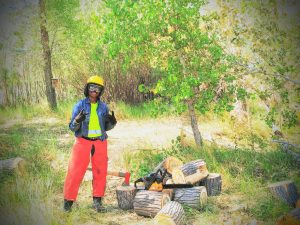From Chicago’s South Side, Brittney Cade went into college wanting to find a career related to her passion for animals. Cade said she thought there were only two viable careers in that field – veterinarian or zookeeper. Once she started at Iowa State University, she discovered a new world of possibilities related not only to animals, but to the environment and natural resources.
Cade earned a bachelor’s degree in animal ecology from Iowa State and her master’s degree in biology (conservation emphasis) from Miami University, in Ohio. Cade is currently working on her PhD in Human Dimensions of Natural Resources at the University of Missouri, in Samniqueka Halsey’s Applied Computational Lab. Halsey is an assistant professor in the School of Natural Resources.
“This entire journey has been a huge learning experience for me,” Cade said. “Where I grew up, we don’t have many resources or access to natural resources. I had to teach myself about this field that I didn’t even know about. I was planning on being a veterinary pathologist until I learned about all of the opportunities in the environmental field. Those opportunities fit more of what I wanted to do and allow me to make a greater impact with wildlife and the ecosystem.”
Cade is a George Washington Carver Graduate Fellow within the MU College of Agriculture, Food and Natural Resources (CAFNR). The George Washington Carver Matching Assistantship for Graduate Studies helps support under-represented scholars in MS and PhD degree programs in CAFNR.

Cade actually heard about a different fellowship at MU in 2020 and was accepted into the program. However, she was also finishing her master’s degree at the same time. While she didn’t end up at MU at that moment, she did find a rewarding opportunity with the Nature Conservancy as an AmeriCorps Stewardship Assistant after completing her master’s degree. Among many tasks, she helped plant 30,000 trees.
Cade also found an interesting research idea while with the Nature Conservancy. Her boss was interested in why a desert tree, referred to as the screwbean mesquite, has been dying off for the past 13 years. The timing of hearing about a potential project was perfect.
“Dr. Halsey actually reached out to me right when I was talking with my boss about this project,” Cade said. “She said she wanted me to consider checking out Mizzou again. I was then able to become a George Washington Carver Graduate Fellow, so I basically found my research idea and my fellowship all at the same time. It all worked out for the best.”
Cade began the pursuit of her PhD at Mizzou in 2021. She is using citizen science from multiple individuals throughout the southwestern United States who have recorded findings about the screwbean mesquite since 2002. Cade said the tree is an important habitat for wildlife and different desert birds and has historical significance as Indigenous cultures use the wood for multiple purposes.
Her focus is on figuring out the cause of the decline as well as connecting people back to nature.
“I’m mainly looking at those recordings to see what the health of the tree was, where the tree was located and if it’s still alive today,” Cade said. “I’m reaching out to the individuals who recorded that information, too. They essentially get to be scientists as well. There’s a major human aspect to this project, and I want people to be as involved as possible.”
Cade said a project of this nature has been incredibly interesting, as the majority of her previous work has been hands-on activities out in the field. This research has allowed her to make more connections with others.
“I’m learning to be a scientist and taking in everything I can to do with this area of interest,” Cade said. “With this current project, I feel like I can make a greater impact, with not only protecting a species and saving it, but also by connecting an entire region of people to this work and having them see the importance.”
Cade said she is using each of her experiences to prepare for her future.
“Every role I’ve had has helped me to broaden my outlook on what I want to be in life,” Cade said. “I still don’t have a pinpoint on an official title, but I’m learning something new each day that I possibly want to do. Even the simple switch from animal science to animal ecology when I first began this process made a huge difference in my goals.”
Cade added that she is incredibly proud of what she’s been able to accomplish so far through her studies, including being featured in international newsletters. She said she is hoping to use those accomplishments to make an impact for the next generation of students interested in the environment – especially those in urban areas similar to where she grew up.
“This work has been very eye-opening, and the younger generation is the one I want to impact the most,” Cade said. “I don’t want them to end up like me, where it took me going to college to figure out that this type of work is even a possibility. I want them to know as early as they can so that they learn the importance and appreciation early on. Even if those students don’t go to college, I want to showcase the environmental opportunities out there for them. This area of study is very important for the future.”